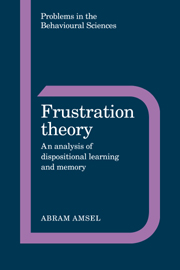Book contents
- Frontmatter
- Contents
- Preface
- List of abbreviations
- 1 Introduction: reward-schedule effects and dispositional learning
- 2 Motivational and associative mechanisms of behavior
- 3 Frustration theory: an overview of its experimental basis
- 4 Survival, durability, and transfer of persistence
- 5 Discrimination learning and prediscrimination effects
- 6 Alternatives and additions to frustration theory
- 7 Ontogeny of dispositional learning and the reward-schedule effects
- 8 Toward a developmental psychobiology of dispositional learning and memory
- 9 Summing up: steps in the psychobiological study of related behavioral effects
- 10 Applications to humans: a recapitulation and an addendum
- Appendix: some phenomena predicted or explained by frustration theory
- References
- Name index
- Subject index
4 - Survival, durability, and transfer of persistence
Published online by Cambridge University Press: 20 March 2010
- Frontmatter
- Contents
- Preface
- List of abbreviations
- 1 Introduction: reward-schedule effects and dispositional learning
- 2 Motivational and associative mechanisms of behavior
- 3 Frustration theory: an overview of its experimental basis
- 4 Survival, durability, and transfer of persistence
- 5 Discrimination learning and prediscrimination effects
- 6 Alternatives and additions to frustration theory
- 7 Ontogeny of dispositional learning and the reward-schedule effects
- 8 Toward a developmental psychobiology of dispositional learning and memory
- 9 Summing up: steps in the psychobiological study of related behavioral effects
- 10 Applications to humans: a recapitulation and an addendum
- Appendix: some phenomena predicted or explained by frustration theory
- References
- Name index
- Subject index
Summary
As will be apparent in this chapter, our work has been greatly influenced by an experiment performed some time ago, independently, by Theios (1962) and Jenkins (1962). Theios, using a runway apparatus and rats as subjects, and Jenkins, working with pigeons in a discrete-trial Skinner box, demonstrated that when one group of subjects acquires a response under CRF and another group under PRF conditions, and then both are exposed to CRF training before an extinction phase, the persistence acquired in PRF acquisition carries through the block of CRF trials, interpolated between acquisition and extinction, so that the PREE survives the common interpolated experience. This was an important finding for what I now call “dispositional learning” because, at the time, it contraindicated hypotheses based on expectancy (Humphreys, 1939b) or discrimination (Bitterman, Fedderson, & Tyler, 1953; Mowrer & Jones, 1945) as necessary for the explanation of the PREE. These two hypotheses are similar in that both interpret the PREE as being a more short-term effect, relating to a detectable change in percentage of reinforcement from the end of acquisition to the beginning of extinction, in the first case in terms of the degree of disconfirmation of an expectancy and in the second case in terms of the discriminability of that change. A related position accounts for the PREE in terms of degree of generalization decrement, from acquisition to extinction, of the sequential effects of carried-over stimulation from reinforced and nonreinforced trials (Capaldi, 1966).
- Type
- Chapter
- Information
- Frustration TheoryAn Analysis of Dispositional Learning and Memory, pp. 61 - 93Publisher: Cambridge University PressPrint publication year: 1992

